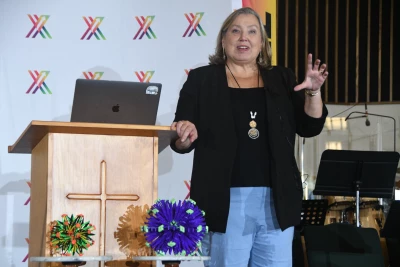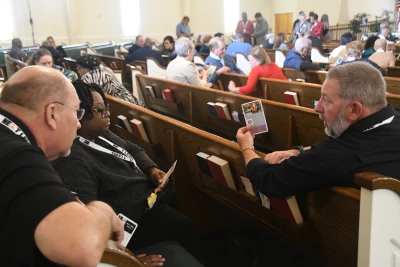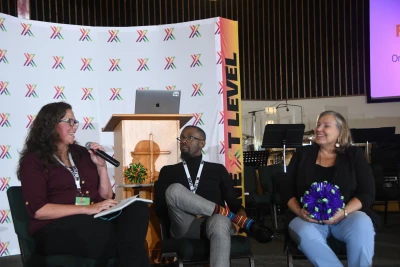Next Level calls for innovation and curiosity
By Melissa Lauber
 Imagine 1,000 experiments being conducted in a spirit of mission and ministry unfolding throughout area United Methodist churches. Imagine sacred spaces brimming with curiosity and creativity. Imagine your church alive with God-inspired innovation that builds vitality, hope, and a faithful future.
Imagine 1,000 experiments being conducted in a spirit of mission and ministry unfolding throughout area United Methodist churches. Imagine sacred spaces brimming with curiosity and creativity. Imagine your church alive with God-inspired innovation that builds vitality, hope, and a faithful future.
On Oct. 19, church leaders from the Baltimore-Washington and Peninsula-Delaware Conferences gathered at Wyoming UMC in Dover to explore how God might fuel their imaginations amid a time that feels like a cultural shipwreck for spiritual institutions.
Leading the conversation was the Rev. Kenda Creasy Dean, a United Methodist pastor, professor at Princeton Theological Seminary and nationally acclaimed authority on innovation. Dean grounded her remarks in the image of a shipwreck from the apostle Paul’s journey in Acts 27.
Ministry on Malta
Shipwreck, theologian Richard Niebuhr said, “is when that which you thought would hold falls apart.”
Beginning with the question, “How much of the church do we need to let go of in order to follow Jesus,” Creasy Dean recounted the story of the violent wind that struck Paul’s boat. Off the shore of Malta, the ship was torn in half – those aboard jumped into the sea, some swimming and others grabbing hold of the flotsam around them to make their way to shore. All 287 of the shipwrecked were brought safely to land.
On the beach, the residents of Malta welcomed them with food and bonfires. They had never encountered Christianity, and Paul and his people set about living and relating to them in such a way that Christ’s story became known. Today, Malta is one of the most Christian nations in the world and Paul is the nation’s patron saint.
Delving into the story, those at Next Level began to explore the metaphors and lessons Malta offered for their local churches.
Has your church thrown anything overboard in the past few years to stay afloat? What’s breaking about in your church or in your faith that you thought would hold, participants were asked. They also considered how the same ship that broke apart, (the established church) also saved them. “God uses the broken pieces to save us,” Creasy Dean said.
In Malta, the people found themselves on an unknown shore. The people there didn’t care about the policy or polity, much the same way today’s culture finds the church increasingly irrelevant. This was a completely new audience for the new church that would be built in Malta.
Are you doing ministry in Malta? In unfamiliar territory, with unfamiliar tools and resources and unfamiliar people? “It takes a lot of energy to be in a new landscape,” Creasy Dean said. “We should not co-opt God into blessing our innovation.” To thrive, United Methodists need to realize that “we’re not the innovator, God is. We’re called to participate in the innovation God is doing.”
The lore on Malta, is that Paul saved Malta, but maybe Malta saved Paul, Creasy Dean said. “This new shore we’ve landed on as a church today might be a part of God’s plan to save us. God doesn’t cause the shipwreck, but God redeems it.”
For those born after 2011, Creasy Dean pointed out, 62 percent were raised in homes where they did not practice a religious faith. “We (the church) have shipwrecked on a different shore,” she said. “We can’t ignore that.”
Building on Curiosity
 To dive into the work of doing new ministry in the metaphorical Malta of today, church leaders need to become curious – maximumly curious – and focus on the three elements of the “religious identity cocktail,” especially when they’re dealing with young adults and the unchurched. Those three elements, that need to be brought together, Creasy Dean said, are belong, behave, and believe.
To dive into the work of doing new ministry in the metaphorical Malta of today, church leaders need to become curious – maximumly curious – and focus on the three elements of the “religious identity cocktail,” especially when they’re dealing with young adults and the unchurched. Those three elements, that need to be brought together, Creasy Dean said, are belong, behave, and believe.
While curiosity is key, United Methodists who want to draw their circle larger must also move beyond curiosity to practice: solidarity, support and sacrifice or being with, being for, and being of.
- Solidarity and the art of neighboring and befriending. The Surgeon General talks about how essential connection is, but for Christians that’s not enough, we want Communion.
- Support and the art of accompaniment. Surveys show that 87 percent of people do believe religion engages and connects them with a sense of purpose. How can the church move to where people are finding that purpose and walk alongside them, affirming that we see God in the work they’re doing? Creasy Dean asked.
- Sacrificial love and the art of self-giving. The key questions, Creasy Dean said, are “What is your worthy dream? And What are you willing to die for?
Diving into these three elements to do ministry on Malta, churches will need to innovate, explore and experiment with non-traditional forms of mission and ministry. This will often mean moving beyond traditional ideas of religion.
“Where do we start?” Creasy Dean said. “Be curious about others and live a life worth being curious about.”
That curiosity will lead church leaders to experiment and create experiences that reach people in new ways. Some may even ask: “Is this church?” The answer is, if Christ is in the midst, it most assuredly is.
During Next Level, participants used Hatch Cards to learn about hundreds of new expressions of church that included a gastropub in Texas, a brewery in Chicago, a worm farm compost project operated by youth in Indiana, food trucks, and even a college dormitory in Wisconsin.
One of the most effective ways of starting such an expression of church is to empower the laity to follow their passions, using their everyday gifts to share God’s love outside of the sanctuary on Sunday morning.
“What does it look like to participate in God’s ‘big idea’ instead of trying to get God to participate in ours,” Creasy Dean asked. “People may not be leaving religion as much as they are changing what being religious means. Is that a threat for Christ’s church – or an opportunity?”
Creating ‘Yes Spaces’
 As part of the Next Level experience, Creasy Dean also introduced a provocative report, Between Ground and Sky: Insights from the New Wesleyan Ecosystem Initiative, from the Texas Methodist Foundation in January 2023.
As part of the Next Level experience, Creasy Dean also introduced a provocative report, Between Ground and Sky: Insights from the New Wesleyan Ecosystem Initiative, from the Texas Methodist Foundation in January 2023.
The study lifted up several ideas for churches that want to “minister in Malta.” They included:
- Create “Yes Space,” where souls and ideas can be nurtured.
- It’s okay to start small and stay small – in fact, that might be the faithful move.
- Revivals need tents, not buildings. Is what we aim for “instances of church,” instead of religious organizations?
- Co-creation depends on relationships outside the Wesleyan movement.
- The wilderness is not the enemy. At what cost do we maintain comfort?
“What would we do if we were not afraid,” Creasy Dean asked the participants. The Revs. Michael Parker, of Journey UMC In Prince George’s County, Maryland, and Chelsea Spyres of the Riverfront Ministries in Wilmington, Delaware, responded with their answers in a panel discussion on taking ministry to the next level.
In her sharing, Spires recounted a prayer she had as she was preparing for ordination. She prayed that “there will be enough yes for the day.” It was a fitting prayer for the closing of Next Level as participants set off to explore how to create ministry on Malta and “discover the church God has in mind.”
The next Next Level Speaker Series will be on March 7, 2024, from 9:30 to 3:30 at Westphalia UMC in Upper Marlboro, Maryland. It will focus on how we thrive, lead, and serve to the next level when experiencing individual and collective trauma and fighting off threats to our bodies, minds, and souls. The featured speaker will be Dr. Deborah G. Haskins, who will empower you to apply a trauma-informed and responsive model to discover healing and wholeness.
